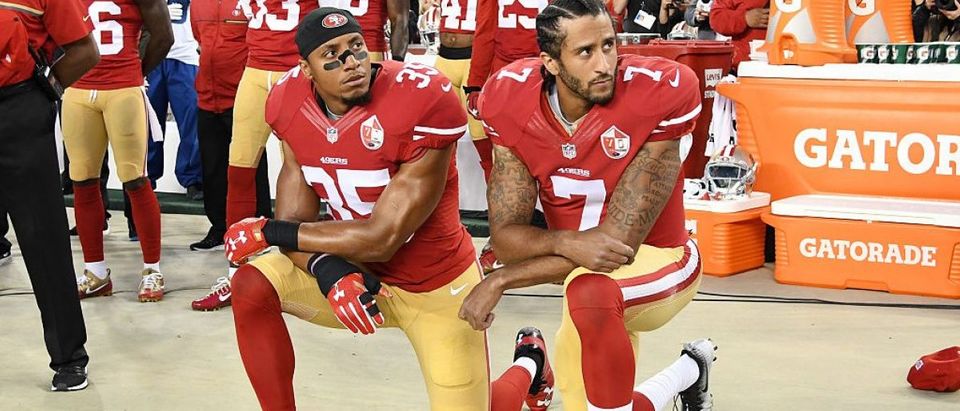The first professional football game I remember was a classic. On January 2, 1982, the San Diego Chargers led by Dan Fouts and his “Air Coryell” passing attack met the Miami Dolphins and their “Killer Bees” defense. The epic lasted nearly five full periods, produced an iconic sports photo, and left at least one little boy sobbing.
My allegiance eventually switched to the hometown Saints. But three and a half decades later, for the first time in my life, I may not a watch a single professional football game—including the Super Bowl. The NFL has become so pussified, corporatized, and politicized it’s unwatchable.
I’m not alone. The NFL’s double-digit ratings drop has constantly bubbled this autumn. The league blames the election. Other proffered factors include Colin Kaepernick’s National Anthem protests, the absence of Tom Brady and other stars, bad officiating, and the ungodly stream of adverts.
All have merit except maybe the ‘lack of stars’ excuse. Tom Brady is as hated as loved and new stars always emerge, see Dak Prescott.
But the NFL’s problems didn’t start this season and the ratings decline likely won’t turnaround. The problems are cultural and political. And even if the stiffs at HQ recognize the problem, the solution—rejecting the politically correct, overexposed corporate version of football they created—would probably be too much for league executives.
People watch the NFL, in part, for its brutality. It’s always been the closest thing to controlled war, complete with generals, field officers, grunts, and the politicians (owners) safely watching from comfort. Even the game’s goals and terminology are martial: ‘breaking the line,’ gaining territory, blitzes, and goal-line stands.
Hyper-masculinity made the games raw and intense in a way no other sport could match. But as the game grew more popular, lawyers and MBAs slowly replaced “football guys” in the front office. The brain trust thought they could steadily increase revenue by appealing to women and the cosmopolitan coastal male without diluting the game’s core support. They did for a while. But success had a price. The game slowly became unrecognizable to die-hards and the expanded market never replaced the game’s passionate core.
Although it likely started long before, I first noticed the NFL’s pussification when Shania Twain sang ‘Feels like a Woman’ during the 2003 Super Bowl halftime show. Nothing against Ms. Twain and her feminine feelings but I began to realize the NFL didn’t care about me—the enthusiast—they cared about people who don’t really care about football, who view it as casual entertainment.
A few years later, the players started wearing pink—a marketing ploy doing no actual good. And the busy bodies began relentlessly attacking the Redskins, even though Native Americans don’t care about the name.
The corporate suits also yanked one and probably another team back to ambivalent Los Angeles. If LA craved pro football they could have had a team years ago, but places like Houston actually wanted football and got it. The LA experiment will end as it did last time—apathetic fans and half-empty stadiums; TV money may not bail them out this time.
Corporatization also killed the viewing experience—endless commercials, constant replays and reviews. Gradually three-and-a-half hours, or an entire day for two games became ungratifying.
Then there is politics. Kaepernick has a thousand ways to use his platform to lobby for the social change he seeks. But his protest feels like just another middle finger to the people who care about the game’s integrity, character, and tradition. It’s not coincidental Donald’s Trump’s political rise coincides with the NFL’s decline. Both represent disgust with the constant virtue signaling and culture dictating by coastal elites who abhor the mores of the people they depend upon to fill seats and voting booths.
An NFL turnaround would require a return to a purer, more masculine, politically incorrect game that for decades stirred America’s passion. Don’t count on it. The next generation of little boys (and some hearty little girls) who buy cards, hang posters, know every player, and cry after heartbreaking losses will keep shrinking. Kids learn that stuff from family; many have had enough are tuning out. As long as the NFL continues to scream, “I don’t care about you,” I’ll respond in kind, and maybe you should too.
Paul H. Jossey is a campaign finance attorney in Alexandria, Virginia. Please follow him on Twitter at @paulhjossey


